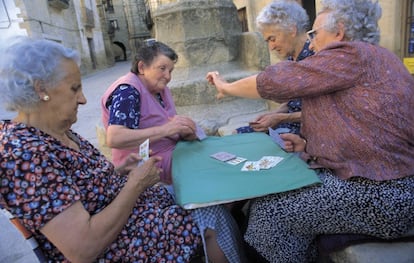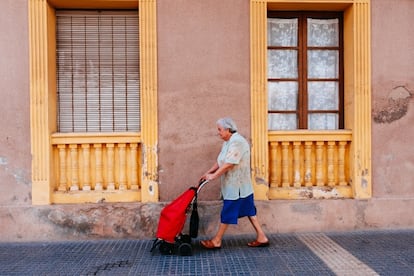16 unwritten rules of living in a Spanish village
There are no fines for disobeying these norms but failure to comply definitely won¡¯t go unnoticed
In small towns, some things work a little differently, including customs and social norms. Indeed, Spanish villages have their own code of unwritten laws that are usually strictly adhered to. There are no fines or punishments for breaking these rules; they are honored because they have always been in place. They are like part of the scenery.

Below is a survival guide that could help save you from the glares of the se?oras of the village in case, for example, you accidentally occupy the space they regularly hang out to play cards in the fresh air. So let¡¯s begin.
ARTICLE 1 ¨C Movement and transportation
¡ì 1 ¨C Parking is prohibited in places where people hang out outdoors. There is an imaginary yellow line in places where neighbors set up chairs at nightfall to enjoy the fresh air. There are no fines for parking in this spot, but be prepared for the consequences if you provoke a mass migration of villagers with foldable chairs.

¡ì 2 ¨C Cars do not have priority. Ever.?In a pickup soccer match, two manhole covers on the street often serve as the perfect configuration for goal posts. In these instances, children have priority over cars. There may also be ¡®kamikaze kids¡¯ flying around on bicycles or toy tractors and they too have priority over cars. And as for people with shopping carts, the entire street is considered a crosswalk.
ARTICLE 2 - People and commerce
¡ì 1 ¨C You must be able to locate all neighbors in an extended kinship system. If someone is about to tell you a story about ¡°Juan, the son of El Mochuelo,¡± before they can continue, you must immediately interject: ¡°Yes, he married Isabela, from the fruit shop.¡± If you don¡¯t do this, the conversation will not flow properly. Only with this added comment can the other person continue with what they were originally going to tell you about Juan, the son of El Mochuelo. Or they can choose to add something else about Isabela from the fruit shop, maybe that ¡°her sister is Virginia, from the Neighbors Association.¡± Perhaps you won¡¯t even get to the original story about Juan. It doesn¡¯t really matter.
¡ì 2 ¨C You have to say hello. Not to everyone. But to almost everyone. And a simple ?Que tal? (¡°What¡¯s up?¡±) is not enough. You have to say how you¡¯re doing, in addition to talking about your entire family.
¡ì 3 ¨C The elderly can always criticize your appearance.?And you don¡¯t have the right to respond. Someone has to warn you if you¡¯re wearing shorts that are too long or pants that are too short¡or a shirt that looks like a shower curtain.
¡ì 4 ¨C True villagers are born in the village. Everyone else is a foreigner. Just as people born there can leave the town and always be considered a part of it, the reverse is also true. Even if you spend 30 years in a village, but were born somewhere else, you will still be considered ¡°the outsider.¡± Of course, after the third month, they will still treat you like one of their own.
A simple ?Que tal? (¡°What¡¯s up?¡±) is not enough. You have to say how you¡¯re doing and talk about your entire family
¡ì 5 ¨C You have to find the areas with a decent cell phone signal. Most towns have a limited number of places from which cell phones can be used. If you leave these zones, you can forget about receiving your WhatsApp messages. This makes it easier to go directly to the house of the person you want to talk to rather than calling.
¡ì 6 ¨C Respect kinship when flirting. Close relatives, ex-girlfriends and committed couples in your social circle are all off limits. So if you¡¯re among the singles returning to the village on vacation, it¡¯s probably best to have a friend give you the lowdown first. Of course, respecting these rules in a small town may greatly reduce your chances of getting any action. But if that¡¯s really what you seek, there are always fiestas in the other towns nearby.
¡ì 9 ¨C Leave the door open. And do it with peace of mind. Who¡¯s going to rob you if you know everyone? In the event that it¡¯s cold or there¡¯s a strong breeze, you also have the option of leaving the door closed, but with a key beneath the mat.
¡ì 10 ¨C Diversify your purchases among the town¡¯s stores. No picking favorites. If there are two fruit markets, divide your purchases between them. If you don¡¯t, people are going to think there¡¯s beef between you and the owners.
ARTICLE 3 ¨C Fiestas and celebrations
¡ì 1 ¨C If you live outside your village, you must take days off to return for all of the fiestas. Even if you miss just one, you will be disowned. You can spend 50 years living in another city and stay a part of the community, as long as you come back for the fiestas. But should you disregard them, woe is you. There is no legitimate excuse for not going to the fiestas every year.

¡ì 2 ¨C The regional fiesta tour must additionally be completed annually. The parties in your hometown are obligatory (do not forget article 3, ¡ì 1), but there is greater flexibility with the ones in surrounding towns. However, you still must attend two or three per year. Beyond being a great way to reconnect with your childhood friendship group, you can also push the limits there more than you can in your own village. Just be careful, and remember: in neighboring villages, you are the outsider.
¡ì 3 ¨C There will be cult bands and orchestras. When a musical number becomes part of the City Hall agenda, it¡¯s likely to be heard year after year, and the song will also be played at the biggest celebrations. Many villages even have their own anthems.

ARTICLE 4 ¨C Folklore and traditions
¡ì 1 ¨C Someone in your family must host a Virgin Mary.?In Spanish villages, this is the closest thing to Airbnb. Every week, a resident of the town accepts a virgin or saint, which occupies a prominent place in the house to be seen by all. However, there are some differences from Airbnb. Most notably, it¡¯s the host who pays for the guest in this arrangement. And unlike Airbnb, this accommodation arrangement doesn¡¯t cause tensions with the local government and neighbors.
¡ì 2 ¨C Rivalries with the surrounding villages must be maintained. It doesn¡¯t matter if you go to their fiestas and have a great time. The hostilities have to be upheld. If you begin to date someone from a rival town, be prepared to be the butt of an endless stream of jokes.
¡ì 3 ¨C You must preserve and even spread the urban legends of your village. Perhaps you know that far-fetched story about what happened to that celebrity who came to your village is completely fabricated. Still, you must continue to tell it, even exaggerating it further. Most villages also have their own horror stories, and have a particular affection for abandoned houses and factories where strange events happen. Or there are those stories about your neighbors¡¯ cousins¡¯ friends who suffered terrible consequences after using an Ouija board. Those sorts of things.
English version by Henry Hahn.
Tu suscripci¨®n se est¨¢ usando en otro dispositivo
?Quieres a?adir otro usuario a tu suscripci¨®n?
Si contin¨²as leyendo en este dispositivo, no se podr¨¢ leer en el otro.
FlechaTu suscripci¨®n se est¨¢ usando en otro dispositivo y solo puedes acceder a EL PA?S desde un dispositivo a la vez.
Si quieres compartir tu cuenta, cambia tu suscripci¨®n a la modalidad Premium, as¨ª podr¨¢s a?adir otro usuario. Cada uno acceder¨¢ con su propia cuenta de email, lo que os permitir¨¢ personalizar vuestra experiencia en EL PA?S.
En el caso de no saber qui¨¦n est¨¢ usando tu cuenta, te recomendamos cambiar tu contrase?a aqu¨ª.
Si decides continuar compartiendo tu cuenta, este mensaje se mostrar¨¢ en tu dispositivo y en el de la otra persona que est¨¢ usando tu cuenta de forma indefinida, afectando a tu experiencia de lectura. Puedes consultar aqu¨ª los t¨¦rminos y condiciones de la suscripci¨®n digital.










































